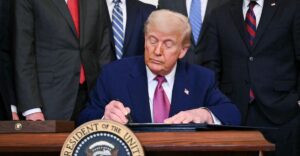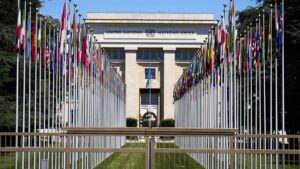
Security guards stand watch as Haiti's Prime Minister Alix Didier Fils-Aime, center, talks with the Mexico's Charge d'Affaires Jesus Cisneros after attending an event marking one year since the start of the Multinational Security Support Mission in Port-au-Prince, Haiti, Thursday, June 26, 2025. (AP Photo/Odelyn Joseph)
UNITED NATIONS — Haiti’s gangs have seized “near-total control” of the capital, Port-au-Prince, as violence escalates across the nation, according to senior United Nations officials. On Wednesday, the U.N. Security Council was briefed on the dire situation by Ghada Fathy Waly, executive director of the U.N. Office on Drugs and Crime, who reported that approximately 90% of the capital is now dominated by criminal groups.
These gangs are not only expanding their influence within Port-au-Prince but are also extending their reach into previously peaceful regions. “Southern Haiti, which until recently was insulated from the violence, has seen a sharp increase in gang-related incidents,” Waly stated. She further highlighted that in the east, gangs are exploiting land routes, including key crossings such as Belladere and Malpasse, where attacks against police and customs officials have been reported.
Escalating Violence and Governance Collapse
The state’s diminishing authority is creating a power vacuum that gangs are rapidly filling, establishing “parallel governance structures” and seizing control of major trade routes. This has led to a paralysis of legal commerce, resulting in soaring prices for essential goods like cooking fuel and rice, Haiti’s staple food.
U.N. Assistant Secretary-General Miroslav Jenca expressed grave concerns, stating that “the ongoing gang encirclement of Port-au-Prince” is pushing the situation closer to a complete collapse of state presence. Without increased international intervention, he warned, the total disintegration of governmental control in the capital could become a reality.
Historical Context and International Response
The surge in gang power follows the assassination of President Jovenel Moïse in July 2021, after which the gangs expanded their control from an estimated 85% of the capital. Since Moïse’s death, Haiti has been without a president, exacerbating the political instability. A U.N.-backed mission led by Kenyan police was deployed to assist in quelling the violence, but it remains significantly understaffed and underfunded, operating at only about 40% of its intended capacity.
Efforts to bolster the mission have stalled, with U.N. Secretary-General Antonio Guterres’ proposal for additional support, including drones and transport, languishing in the council. Meanwhile, the vacuum left by insufficient public security has led to a rise in private security firms and vigilante groups, some of which have been implicated in illegal activities and collusion with gangs.
Impact on Society and Human Rights
According to Jenca, vigilante groups have reportedly killed at least 100 men and one woman suspected of gang association in the past three months. Additionally, there has been a troubling increase in sexual violence perpetrated by gangs, with the U.N. political mission in Haiti documenting 364 incidents involving 378 survivors from March to April alone.
A recent report by U.N. experts highlights how gangs have exploited the political turmoil and the disorganized response to Haiti’s security crisis. The report points to competing political ambitions and allegations of corruption within Haiti’s transitional governing bodies as factors that have hindered effective action.
“While the expansion of territorial control brings gangs additional sources of revenue and bargaining power, these attacks are also backed by individuals trying to destabilize the political transition for their own political goals,” the experts noted.
Future Prospects and International Support
The report underscores the lack of progress in restoring public security or advancing towards national elections, which are slated for February 2026. The Haitian National Police, weakened by leadership tensions and a lack of resources, faces an uphill battle against the well-armed gangs. Despite a U.N. arms embargo, gangs continue to acquire powerful weapons from regional markets and police stockpiles in Haiti and the Dominican Republic.
Experts warn that without stronger international support, gangs will maintain their upper hand. They also caution against the actions of vigilante groups, which often include local police officers who may participate in human rights violations. The Haitian National Police have been implicated in numerous extrajudicial killings, with specialized units reportedly executing 281 suspects, including women and children, in 2024.
The situation in Haiti remains precarious, with the international community facing mounting pressure to intervene more decisively to restore order and support the nation’s path towards stability and democratic governance.







